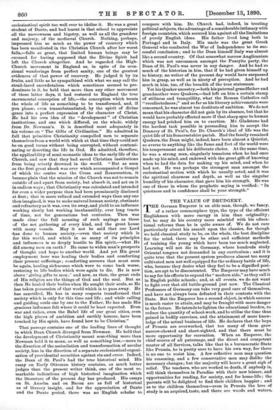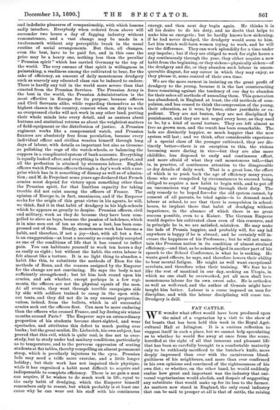THE VALUE OF DRUDGERY.
THE German Emperor is an able man, though, we fancy, of a rather commonplace type, the type of the efficient Englishman with more energy in him than originality ; but he may do his country more mischief with his educa- tibnal reforms than he is quite aware of. We do not care particularly about his assault upon the classics, for though we hold classical study to be, on the whole, the best discipline for the mind, there may be other and sufficient methods of training the young which have been too much neglected. Learning will not die in Germany, where hundreds study Oriental tongues not demanded in any curriculum ; and it is quite true that the present system produces almost too many cultivated men not well equipped for the ordinary battle of life, who, because they desire what they feel to be a dignified posi- tion, are apt to be discontented. The Emperor may have much to say for his efforts to expand the " modern side," as they call it in English public schools ; and, at all events, we do not want to fight over that old battle-ground just now. The Classical Professors of Germany can take very good care of themselves, and have not always been defeated in their contests with the State. But the Emperor has a second object, in which success is much easier to attain, and may be fraught with more danger to the future. He intends to lighten the educational burden, to reduce the quantity of school-work, and to utilise the time thus gained in bodily exercises, and the attainment of more know- ledge of the actual business of life. He declares that the boys of Prussia are overworked, that too many of them grow narrow-chested and short-sighted, and that there must be more opportunity for recreation. When an Emperor, the chief source of all patronage, and the direct and competent master of all Services, talks like that in a bureaucratic State like Prussia, he is pretty sure to have his own way, for there is no one to resist him. A few reflective men may question his reasoning, and a few conservative men may dislike the necessary changes ; but the majority will heave a great sigh of relief. The teachers, who are worked to death, if anybody is, will think themselves in Paradise with their new leisure, and opportunities for reading, for society, and for home-life ; the parents will be delighted to find their children happier ; and as to the children themselves—even in Prussia the love of study is an acquired. taste, and there are woods and waters, and indefinite pleasures of companionship, with which lessons sadly interfere. Everybody when ordered from above will .surrender two hours a day of fagging industry without remonstrance, and a vast change may be made in a twelvemonth without any perceptible break in the usual routine of social arrangements. But then, all changes, even the best, have to be paid for, and in this case the price may be a heavy one, nothing less than the peculiar -ft Prussian spirit" which has carried Germany to the top of the world. The very essence of that spirit is willingness in painstaking, a readiness among the cultivated to bear, for the sake of efficiency, an amount of daily monotonous drudgery such as scarcely any educated class can be induced to endure. There is hardly any toil in the world more severe than that exacted from the Prussian Services. The Prussian Army is the best in the world, the Prussian Administration is the most effective in Europe for its purpose, because officers and Civil Servants alike, while regarding themselves as the highest classes in the country, consent when on duty to work as overpressed clerks will not work in any other land, putting their whole minds into every detail, and as anxious about buttons and statistical returns as about the weightiest matters of field-equipment or the distribution of justice. A Prussian regiment works like a compensated watch, and Prussian finances are absolutely free from peculation, because every individual officer and civilian wearies himself through long days of labour, with details as important but also as tiresome as polishing the cogs of the watch-wheels, or balancing the coppers in a complicated system of bank accounts. Everything is equally looked after, and everything is therefore perfect, and all the perfection is attained by strenuous labour. English -officers watch Prussian officers through a day's work with a sur- prise which has in it something of dismay as well as of admira- tion ; and M. de Freycinet some years ago declared that French .armies must depend for victory upon something other than the Prussian spirit, for that limitless capacity for taking trouble did not exist among the officers of France. The opinion of Europe is, in fact, unanimous, and if the Emperor seeks for the origin of this great virtue in his agents, he will, we think, find it in that habit of drudgery in his high-schools which he appears so greatly to despise. Prussian officers, civil and military, work as they do because they have been com- pelled to slave as boys, because the passion of indolence, which is in nine men out of ten as strong as a lust, has been com- pressed out of them. Steady, monotonous work has become a habit, and therefore, if not a joy—that, with all but a few, is an exaggeration—at least a necessity so completely accepted as one of the conditions of life that it has ceased to inflict pain. You can habituate yourself to work ten hours a day as easily as eight ; but without the habit, the extra labour is felt almost like a torture. It is no light thing to abandon a habit like this, to substitute the methods of Eton for the methods of Bonn, and the reasons assigned by the Emperor for the change are not convincing. He says the body is not sufficiently strengthened ; but let him look round upon his armies, and ask whether, except perhaps in a few regi- ments, the officers are not the physical equals of the men. At all events, they went through terrible campaigns side by side with soldiers trained, to camp in the open with- -out tents, and they did not die in any unusual proportion, unless, indeed, from the bullets, which in all successful armies seek out the officers first. Can men be more enduring than the officers who crossed France, and lay during six winter months around Paris P The Emperor says an extraordinary proportion of his students become short-sighted, and wear -spectacles, and attributes this defect to much poring over books ; but the great oculist, Dr. Liebreich, his own subject, has proved that this evil, which is quite real, is due not to over- study, but to study under bad sanitary conditions, particularly as to temperature, and to the perverse oppression of seating .students at flat tables, thereby compelling an almost permanent stoop, which is peculiarly injurious to the eyes. Prussian lads may need a trifle more exercise, and a little longer holiday; but their work has not impaired their physique, while it has engrained a habit most difficult to acquire and indispensable to complete efficiency. There is no gain a man can acquire, if he wishes to do much work in life, equal to the early habit of drudging, which the Emperor himself remembers only to resent, but which probably is at least one cause why he can wear out his staff with his continuous
energy, and then next day begin again. He thinks it is all his desire to do his duty, and no doubt that helps to make him so energetic; but he haidly knows how sickening, if he had never drudged, the drudgery would seem to him. Let him watch well-born women trying to work, and he will see the difference. They can work splendidly for a time under any impulse; but if they are obliged to work for eight hours a day continuously through the year, they either acquire a new habit from the beginning, or they sicken—physically sicken—of the drudgery and die, or they abandon such labour in uncon- querable disgust, for any career in which they may enjoy, as they phrase it, some control of their own time.
We are the more earnest in insisting on the great profit of drudgery to the young, because it is the last counteracting force remaining against the tendency of our day to abandon for their sakes all methods of annealing them. This generation has abandoned, in England at least, the old methods of com- pulsion, and has ceased to think the compression of the young, their education, as it were, by force, either justifiable or ex- pedient. They are not beaten, they are not disciplined by punishment, and they are not urged every hour, as they used to be, by a kind of moral torture. They are left almost as free as grown men, and the result has been remarkable. The lads are distinctly happier, so much happier that the new system will last ; and we think, after considerable experience of a special class of the younger cultivated, they are dis- tinctly better—there is an exception to this, the vicious becoming more daring in vice—but they are also more childlike, less disposed to early and continuous effort, and more afraid of what they call monotonous toil,—that is, in practice, of continuous attention to the disagreeable or dry details of daily work. That is a great loss, the effect of which is to push back the age of efficiency many years, those who are compelled by circumstances to succeed being obliged to acquire a new habit to begin with, and to put off an unconscious way of lounging through their duty. The only remedy to be hoped for—for the old system cannot, by consent of all parents, be tried again—is to demand much labour at school, to see that there is compulsion in school- hours, to implant there that habit of drudging without impatience, in the absence of which there is no great success possible, even to a Kaiser. The German Emperor would deprive his cultivated class even of this resource, and in principle he is, we are satisfied, mistaken. He may make the lads of Prussia happier, and probably will, for any lad anywhere is happy if he is abroad ; and he certainly will in- crease the happiness of his Professors ; but he will not main- tain the Prussian nation in its condition of almost strained efficiency,—and that, as he acknowledged in another part of his speech to the School Conference, is what he is seeking. He wants good officers, he says, and therefore lowers their ability to bear mental fatigue. He might as well want exceptional acrobats, and therefore relax their training. We fear he is like the rest of mankind in our day, seeking an Utopia, in which no one shall be overworked, yet all men shall love monotonous labour for its own sweet sake. He is orthodox as well as well-read, and the author of Genesis might have taught him better. Labour is a curse imposed on man for discipline, and with the labour disciplining will cease too. Drudgery is drill.











































 Previous page
Previous page